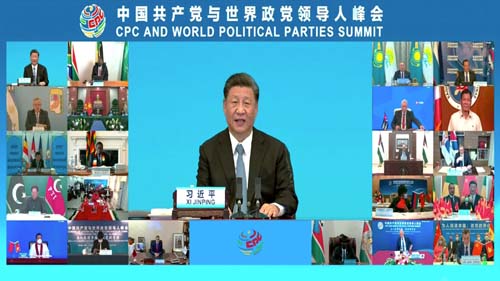
True multilateralism more convincing to world
Wang Wen
The Communist Party of China (CPC) and World Political Parties Summit, held this week, is a new climax of the 100th anniversary of the founding of CPC celebrations. It is also the largest-scale political parties’ summit with the highest level of participants held by the CPC. It is an unprecedented meeting in the history of both global politics and world political parties.
Some 20 leaders of political parties, who are also serving as heads of state and governments, attended the summit and delivered speeches. More than 500 leaders of political parties and political organizations from 160-plus countries, and over 10,000 party representatives also attended it. An event, organized by one country, participated by representatives from three quarters of the world, is spectacular.
I did not want to show off China’s global influence. But it has to be admitted that US and West’s global smears against China have collapsed. The US, which often calls its own style of democracy and freedom as universal values, appears increasingly unpersuasive.
It’s like in a village. The US used to be the richest man who formed a small circle with dozens of relatively wealthy villagers, pointing fingers at China, who has been getting rich fast. More than that, the US also frequently yells at China, clamoring, “Everyone hates you in the village.” But now, three quarters of the villagers are celebrating the CPC’s birthday. Who exactly has more friends? Who represents the whole village?
Such a comparison will probably humiliate the US. As a matter of fact, China doesn’t want to compare with the US over the number of friends they have respectively. Nor will China call for a similar group to confront the US’ so-called democratic alliance. Instead, China wants to promote true multilateralism. It is establishing a new type of party-to-party relationship that is based on norms to seek common ground while shelving differences. We respect and learn from each other.
In President Xi’s speech, there has been no single word that is meant to attack the US. Instead, he shared the CPC’s important experiences accumulated during the past 100 years to jointly seek a better future for humanity with all countries’ political party leaders. Especially when he said that China will never seek hegemony, expansion, or sphere of influence, the representatives listening to his speech around the world gave him a round of applause.
The theme of this summit is, “For the people’s wellbeing: The responsibility of political parties”. This also reflects the great contributions of the CPC to the evolution of the world’s political parties over the past century.
In just half a century, 1.4 billion people have met their basic needs and reached the goal of building a moderately prosperous society in all respects. It is no exaggeration to say that no other political party has achieved as much in the same period as the CPC.
In the view of the CPC, “Party” should not only represent the political interests of a “part” of people, but should try their best to serve the interests of all. The mission of the CPC is to seek happiness for the Chinese people. And this mission should be the greatest consensus of the responsibilities of political parties in the world and the universal value of global politics. This universal value should transcend ideology, geographical boundaries, cultural differences, political systems, and national strength.
Be it US President Joe Biden’s “foreign policy for the middle class” or British Independent Labour Party’s early tenet of achieving working-class representation in Parliament, the responsibility of political parties is to serve the peoples in the end. The only difference is what proportion of the population can be served, and how much capacity the party has to serve its people.
In today’s world, there are about 80 political parties with a history of more than 100 years. However, practice has proved that the CPC is unparalleled anywhere in the world with its vitality, strong organizational capacity, and intergenerational succession mechanism.
One of the most impressive recent events I witnessed was during the ceremony on July 1 to mark the 100th anniversary of the founding of the Party, thousands of young people raised their fists and vowed, “Please rest assured, my Party, the strong country has me.” More than 30 years ago, when I was a primary school student, I often sang the song that, “we are the Communist successors”. Now, I am a grown-up, and the successors are still passing on.
Inheritance is driven not by confrontation with the US, or any other foreign enemies, but by the belief that we will strive for national rejuvenation. As President Xi said at the centenary ceremony, “all the struggle, sacrifice, and creation through which the CPC has united and led the Chinese people over the past hundred years has been tied together by one ultimate theme – bringing about the great rejuvenation of the Chinese nation.”
In the past, Western public opinion has always misunderstood the CPC and even described it as a “red force of evil”. In recent years, the CPC has creatively promoted party-to-party diplomacy. It has also promoted dialogue between the CPC and political parties in other regions to share our experience in governance, working together for the better development of other countries and regions – and the better happiness of the people.
After all, humanity is at a critical crossroads. Political parties have responsibilities to play a role that they cannot ever shirk.
The writer is a professor and executive dean of Chongyang Institute for Financial Studies at Renmin University of China.
